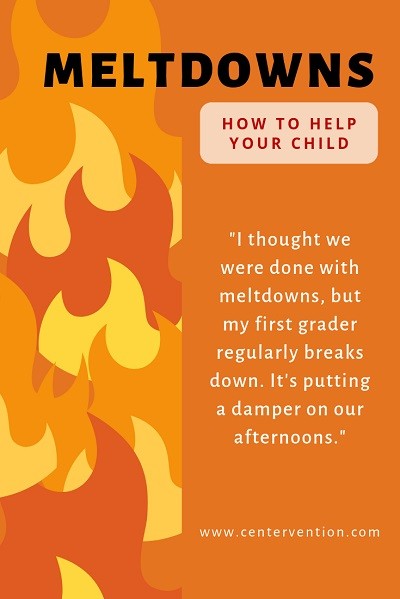
Q: I thought we were done with meltdowns when my daughter graduated from preschool. But, these days, as a first grader, she regularly breaks down. It often happens after school when we’re running an errand or even just hanging out at home. It’s putting a damper on our afternoons.
How can I help my daughter when she’s having a meltdown?
Meltdowns aren’t unusual, especially for kids just getting used to long school days
In preschool, said Jennifer Miller, an expert in social and emotional learning and author of Confident Parents, Confident Kids, kids likely drove their own play, using gross motor skills as they climbed on the jungle gym or set up indoor hopscotch sessions.
Now, for the first time, they may be in school for a full day, five days a week. Instead of running and jumping, they’re focused on fine motor activities like cutting and drawing at their desks. It’s the first time they have to literally limit their motion and movement, and that can lead to a lot of pent up energy and frustration.
“It is a huge sea change for a kindergartner and a first grader to get used to sitting in seats and doing these small activities and focusing their attention on the teacher,” she said. “They come home, physically needing exertion … But mentally, they are completely exhausted, and all self-control that they have been exercising during the day is gone.”
Not only that, they’re probably hungry too. In other words, their tank is completely empty, said Miller, and they haven’t figured out a better way to manage their emotions and energy.
‘Vicious cycle’
In some cases, frequent tantrums and meltdowns may require help from a specialist. They could be red flags for issues such as social anxiety, autism, sensory processing issues, attention deficit hyperactivity disorder or a learning disorder, according to the nonprofit Child Mind Institute.
Even still, parents must find ways to direct them toward better behavior. If parents give in, said Dr. Vasco Lopes, clinical psychologist, in an article on the nonprofit’s website, children will learn that a meltdown will get them what they want.
“It becomes a vicious cycle,” said Dr. Lopes in the article, “because instead of honing and practicing the adaptive skills that kids normally learn to solve problems collaboratively, these kids are learning maladaptive responses when they get frustrated.”
When a meltdown occurs, Miller recommends parents take action in the moment—and once it’s all over.
Guide them to safety
Your reaction will vary depending on where you are. If you’re at a store or on the playground, know that being in a public environment may add fuel to the flames of your child’s meltdown, Miller said.
“They will become aware that people are looking and judging,” she said. “It can really increase the problem.”
When that happens, find a private place to go, such as your car. While you may be eager to pick up and carry your child there, Miller said that’s not always a good idea. Guide them to a quieter space instead.
“If you’re really upset, then grabbing a child’s hand or touching them in any way could escalate the problem because of the emotional energy that is surging through your body,” she said. “Emotional contagion is real. We can increase it by touching one another.”
During a meltdown at home, ask them if there is a specific place in the house where they’d like to collect themselves and if there is a teddy bear or blanket, for example, that might make them feel better.
Model calmness
Even after a child is in a private or preferred space, it’s common for them to resist any help from you to make them feel better, Miller said. So now it’s time for parents to model how to do it.
“Start deep breathing loudly,” she said. “Take care of yourself by modeling it in a pretty obvious way. … So often, as parents, we feel like we need to be immediately responsive and talk it out. We don’t. Just wait. Just deep breathe.”
Miller also recommends using a calming app on your phone to cool down.
Talk about it
Once the meltdown has passed and the child is in a happier place, don’t forget it ever happened.
“By evening or whenever you get a chance, you need to return and say, ‘You were feeling so angry. Tell me how you were feeling. I think it’s because XYZ. Am I right? Is that why? Or were there other reasons?’” she said.
After a long day, with a meltdown in the middle, most parents may want to skip this step. But they shouldn’t, Miller said. Conversations like these can help prevent the next tantrum altogether or, at the very least, help children figure out better ways to handle their emotions.
“We’re exhausted. It’s true,” Miller said. “But you’re helping yourself for the next time.”
Share the love
“Always end the evening with love. Tell them, ‘No matter what choices you made, you can’t get to any level of angry that I won’t love you. That very moment, that very day, there’s nothing you can do.’ They need to hear it that day.”
Jennifer Miller, Expert in social and emotional learning and author of “Confident Parents, Confident Kids”
Skip the punishments
“Don’t start doling out threats, punishments or rewards when a meltdown occurs. You are in the midst of a storm, and there is simply too much stress and anger to lead to any teachable moments. You can work on communicating with your child, but the time and the place must be filled with connection and encouragement.”
Meghan Leahy, certified parent coach, via The Washington Post
Know the triggers
“Anticipating those triggers, and modifying them so that it’s easier for the child to engage in that activity is really important. For example, if homework is really difficult for a child, because she has underlying attention, organization or learning issues, she might have outbursts right before she’s supposed to start her homework. So we say to parents, ‘How can we make doing homework more palatable for her?’ We can give her frequent breaks, support her in areas she has particular difficulty with, organize her work, and break intimidating tasks into smaller chunks.”
Dr. Vasco Lopes, clinical psychologist, via Child Mind Institute
